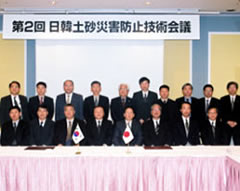The Present Situation of Japan’s Overseas Technical Exchanges
On the Present Situation of Japan’s Overseas Technical Exchanges
By: Sabo Department, Ministry of Land, Infrastructure and Transport
1. Outline of international exchange in the field of sabo( as of 2005)
International cooperation that has been implemented in the field of sabo includes the provision of funds and technologies required for the realization of social and economic development of developing countries, aid to disaster-affected countries, etc., consisting mainly of those which are called the “Official Development Assistance (ODA)”. The major implementation body of ODA is the Japan International Cooperation Agency (JICA). Also, as for international conferences, Japan not only participates in INTERPREAEVENT, but holds individual conferences and others with Italy, Korea, etc. as well. This article is to make a presentation of these.
2. Project-type technical cooperation
(1) Nepal
Project name: “Disaster Mitigation Support Programme Project” Outline: Technical cooperation aiming at matters such as tree planting involving residents, disaster prevention activities through improvement works, disaster rehabilitation activities through the construction of sabo facilities, etc., the construction of a database – GIS – information network on disaster information, etc., and the increasing of disaster prevention awareness by holding lecture meetings, etc. for local residents. Period of implementation: 5 years starting from September 1, 1999
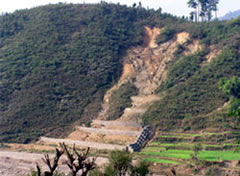 Hillside works at a model site in Girubari
Hillside works at a model site in Girubari
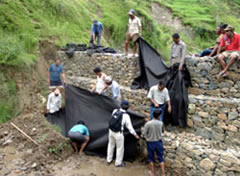 Resident participation in constructing Sabo dams
Resident participation in constructing Sabo dams
(2) The Philippines
Project name: “Project for Enhancement of Capabilities in Flood Control and Sabo Engineering of the DPWH” Outline: Technical cooperation aiming at matters such as the improvement of the function, organization and system of the Flood Control and Sabo Engineering Center, the establishment of independent activities like researches and investigations, the preparation and utilization of technical criteria for sabo, etc., the establishment of information systems for judging the situation of damage to disaster prevention structures, the training of engineers and the utilization of results like the technical criteria prepared, etc. at the implementation body of disaster prevention works (DPWH). Period of implementation: 5 years starting from January 12, 2000
(3) Indonesia
Project name: “Integrated Sediment-related Disaster Management Project for Volcanic Areas” Outline: Technical cooperation aiming at matters such as the making of models of disaster prevention projects through cooperation between residents and the administration like the utilization of experiential knowledge of residents, warning and evacuation by residents themselves, and the maintenance and control of facilities by residents, the training of engineers in cooperation with universities and related bodies, and the implementation of educational activities for residents like seminars. Period of implementation: 5 years starting from April 1, 2001
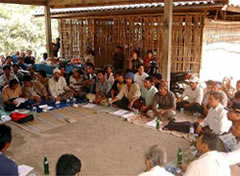 A disaster-prevention activity (meeting at Daya colony)
A disaster-prevention activity (meeting at Daya colony)
(4) China
Project name: “Project for Enhancement of Capabilities in Flood Control and Sabo Engineering of the DPWH” Outline: Technical cooperation aiming at matters such as the improvement of the function, organization and system of the Flood Control and Sabo Engineering Center, the establishment of independent activities like researches and investigations, the preparation and utilization of technical criteria for sabo, etc., the establishment of information systems for judging the situation of damage to disaster prevention structures, the training of engineers and the utilization of results like the technical criteria prepared, etc. at the implementation body of disaster prevention works (DPWH). Period of implementation: 5 years starting from January 12, 2000
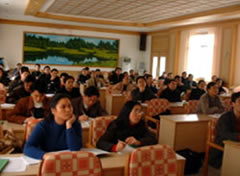 Technical training of observing landslides and debris flows (December 2003, in Guiyang)
Technical training of observing landslides and debris flows (December 2003, in Guiyang)
3. Technical cooperation through the dispatch of individual experts
(1) Iran
Dispatched to: Ministry of Jihad-e Agriculture, Islamic Republic of Iran (Tehran) — On the Present Situation of Japan’s Overseas Technical Exchanges
Outline: To carry out the transfer of technologies and experiences in Japan for the purpose of preventing and mitigating sediment-related disasters, flood damage, etc. in Iran.
Period of dispatch: August 2001 –
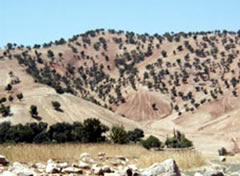 Catchment area of Karoon River
Catchment area of Karoon River
(2) Venezuela
Dispatched to: Ministry of Internal Affairs and Justice (Caracas)
Outline: Implementation of technical cooperation concerning sabo and measures against landslides, as part of disaster prevention measures in Venezuela.
Period of dispatch: May 2002 –
4. Acceptance of technical trainees
(1) Volcanology and Sabo Engineering Course
It is to seek the promotion of the learning, by engineers engaging in the observation of volcanoes and the work of sabo, of theories and technologies concerning the observation of volcanoes and sabo for the prevention of disasters related to volcanoes, as well as the promotion of friendly relations. For Fiscal Year 2001, it was implemented during the period of March 19 – September 15, 2002, and 7 persons from El Salvador, Indonesia, the Philippines, China, Iran,
Period of dispatch: August 2001 –
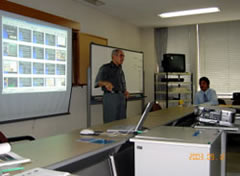 Presentation
Presentation
(2) Training of counterparts
It is implemented with a view to seeking the propagation of Japan’s technologies and knowledge by way of people assuming leading roles in the field in question in the recipient country (counterpart personnel: C/P) over a wide range within the said developing country.
The achievements of acceptance for Fiscal Year 2002 are as follows.
1) C/P training for the Disaster Mitigation Support Programme Project in Nepal
2) C/P training for the Integrated Sediment-related Disaster Management Project for Volcanic Areas in Indonesia
3) C/P training for the Study on Sabo and Flood Control for Western River Basins of Mount Pinatubo in the Republic of the Philippines
4) C/P training for the Project for Enhancement of Capabilities in Flood Control and Sabo Engineering of the DPWH in the Republic of the Philippines
5) C/P training for the Human Resource Development Project for Water Resources in the People’s Republic of China
6) Iran counterpart training
(3) Country Focused Training Course, Iran (sabo, 6 persons)
It was implemented, with a view to making contributions to the improvement of capabilities of sabo engineers in Iran by introducing specific working sites of sabo in Japan to administrators of the managerial class engaging in practical work in Iran, who are involved in the formulation of plans, planning, examination, implementation and evaluation concerning the business related to development planning, from June 25 – August 11, 2002 for the last fiscal year. It is scheduled to be implemented in this fiscal year as well.
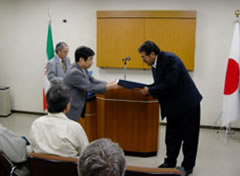 Closing ceremony
Closing ceremony
5. Development study
The development study is placed in the “preliminary stage” as called in the project cycle, and is implemented by using methods such as the devising of the “M/P (Master Plan)” that summarizes the development plan, and the “F/S (Feasibility Study)” for investigating the suitability of each of the projects to be planned based on the Master Plan, and the following have been implemented as sabo-related development studies in recent years.
Fiscal Year 2000
The Study on Urgent Plans for Flood Control and Measures against Landslides in the Metropolitan Area in Honduras
Fiscal Year 2001
The Study on Sabo and Flood Control for Western River Basins of Mount Pinatubo in the Republic of the Philippines The Comprehensive Study on Sediment Disaster Prevention for Vargas State and Caracas City in Venezuela
Fiscal Year 2002
The Development Plan for the Formulation of Comprehensive Measures against Sediment-related Disasters and of Plans for the Restoration of the Environment and Ecology in Small River Basins in Yunnan Province in the People’s Republic of China
Fiscal Year 2003
The Project for Urgent Countermeasures for Sedimentation in Wonogiri Multipurpose Dam Reservoir in Indonesia The Study on Flood and Debris Flow in the Caspian Coastal Area Focusing on the Flood-hit Region in Golestan Province in Iran Master Plan on Measures against Landslide Disasters in Armenia
6. International conferences (Achievements for Fiscal Year 2002)
(1) International conference concerning sediment-related disasters (INTERPRAEVENT2002)
It was held with a view to providing researchers and engineers related to disaster prevention in various countries all over the world with the place for academic exchange over a wide range concerning disaster prevention, at the same time providing various countries overseas with Japan’s advanced academic and technological levels concerning “sabo and erosion control”, thereby making contributions to the development of disaster prevention technologies in the world.
Sabo and Flood Control (Vol. 155) Dec. 20, 2003 —
From October 14 through 18, 2002, an international conference was held in Matsumoto City, sponsored by the Secretariat for INTERPRAEVENT in the Pacific Rim, with about 400 people from 14 countries mainly from Europe and the Alpine region participating in it.
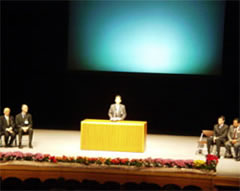
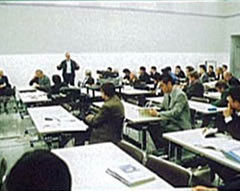
(2) Summit (Summit Matsumoto)
During the period of the INTERPRAEVENT conference held in Bern in 1992, an Summit (Summit Matsumoto) advocated by Japan was held, and thereafter it is held once every 4 years on the occasion of the INTERPRAEVENT conference. The conference is attended by sabo administrative officials participating in INTERPRAEVENT, who carry out sabo projects in each of the countries as national projects, and opinions are exchanged there.
It was held on the occasion of the INTERPRAEVENT 2002 conference in Matsumoto in 2002.
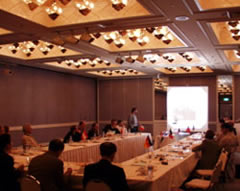
(3) Japan-Italy Sediment Disaster Prevention Technology Conference
In November 1999, the 1st Japan-Italy Sediment Disaster Prevention Technology Conference was held in Tokyo and Kagoshima. At the beginning of the conference held in Tokyo, an agreement on implementation concerning technical exchanges between the two countries was signed. The 2nd Conference was held from October 16 – 20, 2000 in Roma City, Venezia City, and Longarone City, Italy. The 3rd Conference was held from April 8 through 12, 2002 in Hiroshima and Tokyo.
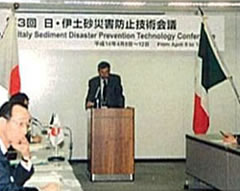
(4) Sediment-related Issues Committee of the 3rd World Water Forum
In the 3rd World Water Forum (held in March 2003), the Session of Sediment-related Issues was held to proceed with the picking out of sediment related issues in various regions of the world, and at the same time proposals concerning the international sabo network were put together in various regional meetings.
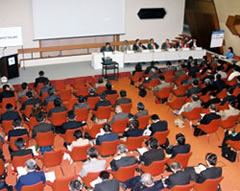
(5) Sediment Disaster Forecasting and Warning System Pilot Project in the Hydrological Component, Typhoon Committee (- 2005)
In the General Meeting of the Typhoon Committee held in November of Fiscal Year 2001, it was determined that the Sediment Disaster Forecasting and Warning System Pilot Project be scheduled to be implemented by 2005. This project is to let each of the participant countries select a pilot area to construct a Sediment Disaster Forecasting and Warning System in the area, thereby studying its applicability. Japan is to be charge of this project to take the lead in the project.
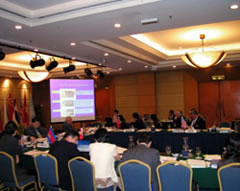
(6) Sediment Disaster Prevention Technology Conference between Korea Forest Service and MLIT, Japan
It was held from March 28 through 30, 2002 in Seoul with a view to exchanging information between Korea Forest Service and Japan on the latest trend of the handling of measures against sediment-related disasters in Japan and the Republic of Korea, thereby making contributions to sabo administration as well as technical research and development in the two countries hereafter, and the 2nd Conference was held on March 21, 2003 in Osaka.
